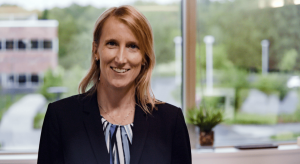
Astellas Pharma’s U.S.-based subsidiary focused on cell therapy and other forms of regenerative medicine is laying the groundwork for a possible expansion into exosome therapeutics, through a collaboration with Australia’s Exopharm.
The Astellas Institute for Regenerative Medicine (AIRM) has signed a Master Collaborative Services Agreement (MSA) with Exopharm, through which the partners plan to carry out initial lab work, with the goal for Astellas of deciding whether exosome products can be added to its pipeline.
“The partnership with Exopharm is, at this stage, just a research-stage collaboration,” Erin Kimbrel, PhD, AIRM’s vp, research told GEN Edge. “We’re going to look into the technology. But we haven’t made any large decisions on it, so it’s a preliminary look.”
“We focus on cell-based therapies, and with that comes the recognition that these cells do secrete exosomes,” Kimbrel added. “They’re very interesting as a cell-free modality. They’re packed with lots of important types of cargo. Naturally, it was a natural progression to take a look at this.”
The lab work covered by the partnership will begin at Exopharm’s laboratories in Melbourne, Australia, when the partners seek to purify exosomes derived from two proprietary AIRM cell lines by applying Exopharm’s Ligand-based Exosome Affinity Purification (LEAP™) technology platform.
Last December, Exopharm was granted U.S. Patent No. 11,202,805 for the LEAP purification method, in which an inexpensive functionalized polymer or “LEAP Ligand” is loaded into a chromatography column, and sticks to the membrane surface of exosomes/vesicles. As liquid containing exosomes (also known as extracellular vesicles, or EVs) flows through the chromatography column, the LEAP Ligands bind to many of the exosomes while biological detritus in the cell culture medium is washed away.
According to Exopharm, LEAP Ligand technology offers four advantages over other purification approaches: proprietary technology, lower cost, binding to rather than decorating the exosome membrane, and using affinity chromatography tools.
In the second phase of the collaboration, the LEAP technology will be transferred to AIRM research headquarters in Westborough, MA, for further evaluation.
The advantages of human exosomes delivered as an acellular therapy have been thoroughly investigated. “But purification of exosomes as a biomanufacturing process has blocked progress,” Ian Dixon, PhD, Exopharm’s managing director and founder, said. “Exopharm’s patented LEAP purification technology changes all that—opening up the very real prospect of exosomes as next-generation medicines to treat unmet medical needs.”
Lock and LOAD
Two proprietary AIRM cell lines will be engineered to produce exosomes loaded with functional RNA, through Exopharm’s LOAD technology platform for API loading. LOAD, which Exopharm in-licenses from the State University of New York at Buffalo, enables the company to load the exosomes with different types of specialized therapeutic cargo, from microRNAs to proteins.

The cell lines will also be engineered to add external specified molecules of interest onto their surfaces using Exopharm’s Extracellular Vesicle Positioning System (EVPS) technology platform. EVPS enables the addition of custom surface proteins to exosomes for targeting specific tissues, and was in-licensed in 2020 from Santa Clara University.
“EVPS helps with tropism and targeting of the EVs to specific types of target cells, as a way to better provide that specificity,” Kimbrell explained. The study period is anticipated to take six to nine months, she said.
Astellas is not saying if, upon validation of the Exopharm technologies, the exosomes would be made in-house or through Exopharm or another partner.
The companies did disclose, however, that AIRM has agreed to pay Exopharm up to $481,000 in fees over about 15 months, starting next month.
Astellas is among a number of biopharmas large and small that have shown interest in manufacturing or developing exosome therapeutics in recent years.
In August 2021, South Korea-based ExoCoBio began construction of a $20 million, 42,000-square-foot exosome-based drug manufacturing and R&D facility in Osong, Chungcheongbuk-do—the first of its kind in the world, according to the company.
Three months later, Lonza acquired Codiak BioSciences’ exosome manufacturing facility in Lexington, MA, and became a strategic manufacturing partner for Codiak’s pipeline. While the purchase price wasn’t disclosed, the companies said Codiak would receive approximately $65 million of in-kind cGMP manufacturing services.
Codiak—whose president and CEO Douglas E, Williams, PhD, discussed the company’s technology with GEN Edge last year—has collaborations in progress with Jazz Pharmaceuticals (up to $1 billion, inked in 2019) and Sarepta Therapeutics ($72.5 million upfront and near-term license payments disclosed) to apply its engEx™ precision engineering platform to develop exosome therapeutics for, respectively, cancer and neuromuscular targets.
Among small-cap biopharmas, Capricor Therapeutics is developing an exosomes program that includes a multivalent exosome-based mRNA vaccine for preventing COVID-19, as well as engineered exosomes loaded with mRNA and other nucleic acids for use in drugs and vaccines. And last year, Oxford, U.K.-based Evox Therapeutics completed a £69.2 million (about $93.7 million) Series C financing round, toward advancing its exosome therapeutic candidates into the clinic.
First major collaboration
For Exopharm, the partnership with AIRM marks the Australian company’s first collaboration with a major biopharma.
“Our strategy is to make our proprietary technologies available under license to leading pharmaceutical companies such as Astellas,” Dixon stated. “Exopharm has the potential to build ongoing revenue streams from such licenses through multiple alliances. Technical collaboration, demonstration, and sharing data—as provided by this agreement—is the critical first step.”
Astellas’ pipeline of 26 drug programs includes cell therapies that AIRM is developing. AIRM’s lead program is ASP7317, a Phase I candidate consisting of retinal pigmented epithelium cells and targeting geographic atrophy secondary to age-related macular degeneration, as well as Stargardt disease.
Addressing analysts at Astellas’ quarterly earnings call on February 2, Naoki Okamura, who wears several hats as the company’s chief strategy officer, CFO, and CBO, said screening and enrollment in the Phase Ib trial for ASP7317 (NCT03178149) was put on hold “due to a manufacturing delay,” according to an accompanying presentation.
AIRM president Masahide Goto, PhD, told GEN Edge that the trial also encountered delays in patient recruitment due to COVID-19. “We strongly expect that we can resume the clinical study this year.”
Also under development at AIRM are preclinical, discovery-phase programs in retinitis pigmentosa based on photoreceptor rescue cells, in glaucoma and optic neuropathy based on ganglion rescue cells, in corneal dystrophy based on corneal endothelial cells, and in vascular disease based on vascular progenitor cells. As with ASP7317, Astellas acquired the preclinical programs when it bought Ocata Therapeutics for $379 million, in a deal completed in 2016.
AIRM is also working on a pair of cell therapy collaborations launched in July. Astellas has licensed ExCellThera’s UM171 compound and other pluripotent stem cells (PSCs) and PSC-derived cells for in vitro use, agreeing to pay ExCellThera an upfront payment, future milestone payments, and manufacturing and supply fees, all undisclosed.
Astellas has also partnered with Minovia Therapeutics to research, develop, and commercialize novel cell therapy programs for diseases caused by mitochondrial dysfunction. The companies are researching therapies consisting of cells derived from Astellas’ genetically engineered, induced pluripotent stem cells and augmented with Minovia’s Mitochondrial Augmentation Therapy (MAT) platform technology. Astellas has expanded into mitochondrial biology over the past four years by acquiring Mitobridge (up to $450 million) and Nanna Therapeutics (up to £69.5 million [about $94.1 million]).
Joining AIRM in advancing cell-based treatments at Astellas are two U.S. subsidiaries: Universal Cells, which engineers stem cell lines designed to avoid rejection for use in allogeneic cell therapies; and Xyphos Biosciences, which is developing a preclinical pipeline of cancer cell therapies.
“Our ultimate goal is absolutely to launch our products to the market and sustain our activities, using a cell therapy approach,” Goto added.





